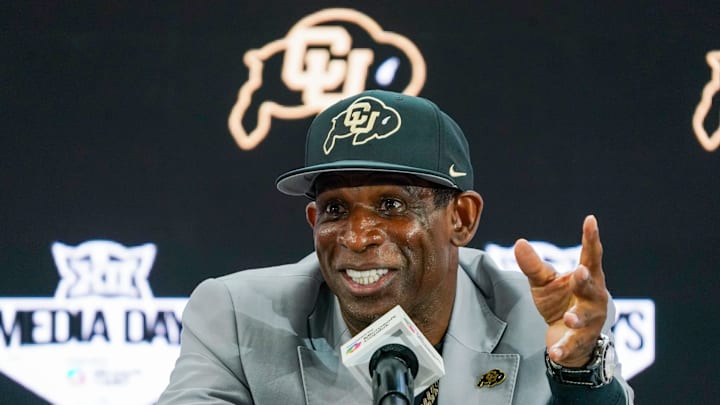At Big 12 Media Days last week, Colorado head coach Deion Sanders called for the institution of a salary cap in college football, speaking out against the growing divide between the super-rich programs and the rest of the field.
His comments immediately drew criticism, as any comments Sanders makes tend to do. I'm convinced he could step outside, see sunny skies, and comment about how nice the weather is, and someone, somewhere, would criticize him for not speaking out against rainy days.
Controversy follows Coach Prime wherever he goes. He's brought some of that on himself, no doubt, but a lot of it he has not.
When Sanders called for a salary cap in college football, he drew criticism for not asking about it when his son, Shedeur, and two-way superstar Travis Hunter were in Boulder. Folks assumed it was because Colorado was paying them a lot of money to play there, ignoring the fact that both were deeply connected to Sanders, and at least in the case of Hunter, could have made demonstrably more money elsewhere.
Of course, Sanders isn't wrong in his comments about a salary cap. And two other Big 12 coaches made similar comments at Big 12 Media Days, just without the public outcry or press.
Mike Gundy and Kyle Whittingham join Deion Sanders in calling for a cap
Oklahoma State's Mike Gundy and Utah's Kyle Whittingham, two of the longest tenured coaches at single schools in the FBS, also made comments about leveling the playing field across the sport with a cap.
Here's what Gundy had to say:
"Then you can build collective bargaining. We've all talked about it. But you have to admit they're employees. You can do it all. You can have a [cap] and you need an entry level for a high school player coming in because it's not sustainable."
And Whittingham followed with:
"Biggest issue is we've got to have somewhat of a level playing field with the NIL space," Whittingham said. "Bottom line, they're professionals, they're getting paid like professionals and we've got to get a handle on that. We can't have X amount of schools paying, spending $50 million on rosters and the rest of us $12 million.
"There's about 12 teams that'll have a chance to win it all every year and that's it. So I would say leveling the playing field with a salary cap, again, back to the NFL model, and making things more uniform. It works in the NFL, so why can't it work at this level?"
Both are saying essentially the same thing Sanders said, just without the controversy and criticism.
It's a sentiment felt strongly by all of the coaches in the Big 12, and in reality, any coach who is outside of the SEC and Big Ten. Those two power conferences are building a wall around themselves, and are closing in more of a "power-two", keeping the ACC and Big 12 on the outside looking in.
Those conferences bring in more money with TV revenue, and coaches and administrators in the Big 12 can see themselves falling behind.
So what Coach Prime said wasn't at all controversial, no matter how badly folks want to twist his words and assume ulterior motives. He's speaking the truth, and the same truth as his peers.
